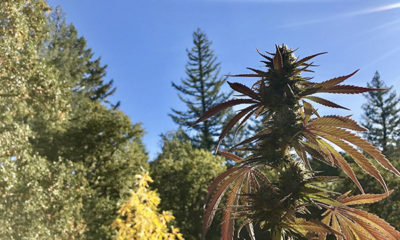
Joint Opinions
Alcohol’s Interest in Cannabis Could Be a Reason Not to Legalize Nationwide
The cannabis industry might need more time before going up against the alcohol industry.
It might be a bit of a broken record to keep engaging in the discussion about how the cannabis industry is chipping away at the bottom line of Big Alcohol. Rest assured, there will be more at stake with respect to this battle of buzz in the not so distant future.
Up to this point, however, the narrative surrounding the power of pot versus alcohol has been mostly rooted in pride and bragging rights — as it should be. Despite the fact that marijuana is still mostly an outlaw substance in the United States, cannabis sales, which stem from pot positive policies in only handful of states, continue to drive a multi-billion dollar marketplace.
What’s more is there are no signs that this leafy child of the American “sin stock” sector will back off its mission to become the leading recreational substance of choice anytime soon. Some of the latest data predicts that legal weed will be produce $40 billion of economic growth and employ around 400,000 people by 2021. Because of this, the monsters of mainstream mercantile are lurching the distance.
The latest word from Wall Street is that major alcohol companies have started to take notice of the infinite potential of becoming an a great American weed slinger. Marijuana is now being taken seriously by Anheuser-Busch InBev SA/NV, The Boston Beer Company and Brown-Forman Corp. (Maker of Jack Daniels), and perhaps even cursed by high-rolling executives at risk of losing their quarterly bonus check if pot swallows up one more percentage point of their company’s profits.
It is for this reason that the folks behind beer, wine and hard liquor are watching closely to see what happens to booze when Canada finally legalizes marijuana later this year. They hope to get a sense for how to handle the situation should the United States move in a similar direction.
“Canada’s going to be just a wonderful test market for the U.S. to see how it all plays out,” CFRA Research market analyst Joe Agnese said in a recent interview with the Financial Post.
Meanwhile, the cannabis industry just keeps on cheering itself on as though the game is already over. It is not. There is some concern that all of the flexing and flaunting could eventually come back and cause some extensive damage to those cannapreneurs without the strength and sustainability to keep breathing in a truly legal market.
Some of pot’s main players seem to have forgotten that all of the early success of legal marijuana has been riding on federal prohibition. This all-important detail has prevented major corporations, including those connected to alcohol and tobacco, from getting serious about swooping in like blood-thirsty vultures to feast on the action one cannabis casualty at a time.
These larger than life companies, most of which come with unlimited financial resources, are no longer pulling any punches about their schemes and dreams to enter the marijuana game with brute force.
“The question is… once there’s clarity around it becoming legalized, how significantly does the alcohol industry get involved with the cannabis industry? Do they participate through M and A or develop their own infused beverages?” Agnese said.
We already know that the beer industry is moving toward developing its own products. Last year, Constellation Brands, the third largest brewer on the face of the planet, invested $200 million in a Canadian cannabis company. The goal is this deal was to bankroll the development of THC-infused beverages to be distributed in dispensaries all over the northern nation.
Although the company’s CEO said none of the marijuana-infused products would be sold in the United States, rest assured all bets are off as soon as the federal government agrees to go legal.
It is at that point that brewers and other boozy corporations might get the upper hand when it comes to marijuana. These companies have spent decades building relationships inside the war zone of taxed and regulated feel goods. They are connected in Congress and Wall Street and will likely receive preferential treatment when striking new deals. But none of this is even possible until the federal government makes a change in national pot policy. Alcohol companies will not risk what has taken, for some, more than a hundred years to build into a national staple defying federal law.
Looking ahead, there are no signs that federal legalization is around the corner. Regardless of the traction legal weed has gained over the past decade, the issue is spinning its wheels in the halls of Congress. But considering the cutthroat nature of the American buzz scene, this might be for the best. Perhaps the cannabis industry needs more time to build itself up into a bigger beast, so it can defend itself as a true contender when the time comes to fight all of those who threaten to steal its thunder.
TELL US, do you think the cannabis industry is ready to face off against the alcohol industry?























